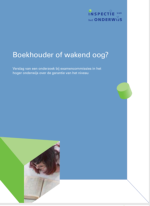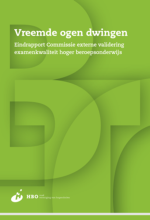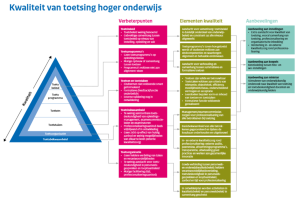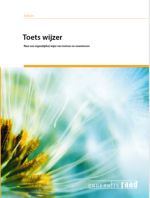Studies, reports and advices by the Higher Education Inspectorate and others, regarding the quality of the examination practice and the role and functioning of Examination Boards
Below you will find a brief overview of how national thinking on the quality of examinations has developed in the course of the last couple of years, which is reflected in national research by among others the Higher Education Inspectorate (Hoger Onderwijs Inspectie) and formal guidelines issued by official national bodies. Unfortunately, not all the mentioned sources are available in English.
Inspectorate and committee reports on the functioning of Examination Boards in higher education  In 2009, the Dutch Higher Education Inspectorate carried out an investigation into the functioning of Examination Boards in higher education. One of the points for attention in this study was the way in which the Examination Boards checked whether with the assessment programme in total the intended final level of the study programmes were met. Could this be guaranteed? The study was part of the legislative proposal 'Reinforcing Governance' (Dutch: Versterking Besturing), in which the role and tasks of the Examination Boards were accentuated. This study set the tone and gave higher education a wake-up call: Examination Boards had to reinforce themselves and fulfill their new tasks and responsibilities in a more significant and powerful way. This was described in the report under de name of Boekhouder of wakend oog
In 2009, the Dutch Higher Education Inspectorate carried out an investigation into the functioning of Examination Boards in higher education. One of the points for attention in this study was the way in which the Examination Boards checked whether with the assessment programme in total the intended final level of the study programmes were met. Could this be guaranteed? The study was part of the legislative proposal 'Reinforcing Governance' (Dutch: Versterking Besturing), in which the role and tasks of the Examination Boards were accentuated. This study set the tone and gave higher education a wake-up call: Examination Boards had to reinforce themselves and fulfill their new tasks and responsibilities in a more significant and powerful way. This was described in the report under de name of Boekhouder of wakend oog

Due to incidents and negative media reports about the quality of examinations, there was unrest within society about the value of higher (vocational) education diplomas. In December 2011, the Netherlands Association of Universities of Applied Sciences (HBO-raad; later renamed Vereniging Hogescholen) set up a "Committee for External Validation of HBO Examination Quality". This is often referred to in a more informal way as the "Bruijn Committee" (commissie Bruijn) . After investigation, the committee came up with a number of recommendations, in which the importance of external validation in particular came to the fore, described in their report " "Vreemde ogen dwingen
The most important points of attention were: start with joint examinations, invite external members in the Examination Boards, work with certified examiners. The inclusion of external members in an EB was also later legally anchored. The starting point of the committee was: 'external eyes' can help to guarantee the quality of exams. In addition, the committee has given an impulse to research in the field of assessment quality and assessment policy. In the Universities of Applied Sciences (hbo's) various professorships in the field of assessment were founded.
Five years after the earlier study into the functioning of Examination Boards and after several changes in the WHW (Dutch education law), the Education Inspectorate re-examined the functioning of Examination Boards in higher education. The conclusion was that the boards had clearly strengthened themselves over the past years, but that there were also various points for attention and improvement. These points still deserve attention. In the report Inspectierapport Verdere versterking examencommissies in het hoger onderwijs these points are described.
In English available: Further Improvement: Examination boards in higher education | Publicatie | Inspectie van het onderwijs (onderwijsinspectie.nl)
As a result of this report, two conferences were organized.
- Conferentie 'Versterking examencommissies' 20 mei 2015. Organized by the Hoger onderwijs Inspectie (Higher Education Inspectorate). See naslagwerk. In English available as examination-boards-in-higher-education.pdf
- Conferentie 'Versterking examencommissies' 9 maart 2016. Organized by the VSNU (Association of Dutch universities).

In 2016 the Higher Education Inspectorate drafted a guideline to make better use of some of the findings from earlier studies to support higher education in their endeavor to stimulate the quality of examination: De kwaliteit van de toetsing in het hoger onderwijs. The most important conclusions and tips were summarized in a compact scheme. In an article by Martine Pol en Suzan Klaver in Hoger Onderwijs Management 2016 the main points are also indicated.
Advice about examination by the Higher Education Council (Hoger Onderwijsraad) (Dec. 2018) The Higher Education Council advises the government and higher education institutions. Dec. 2018 the council drafted advice for the Ministry of Education (Download report). The report addresses education in general but also pays specific attention to higher education. One advice is that a more balanced assessment and examination practice is needed so that assessments and examinations contribute more to the quality of education.
The Higher Education Council advises the government and higher education institutions. Dec. 2018 the council drafted advice for the Ministry of Education (Download report). The report addresses education in general but also pays specific attention to higher education. One advice is that a more balanced assessment and examination practice is needed so that assessments and examinations contribute more to the quality of education.
